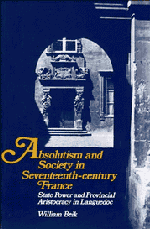 Absolutism and Society in Seventeenth-Century France
Absolutism and Society in Seventeenth-Century France Book contents
- Frontmatter
- Contents
- List of tables
- List of figures
- Preface
- List of abbreviations
- Map: Languedoc in the seventeenth century
- PART ONE INTRODUCTION
- PART TWO THE DISTRIBUTION OF AUTHORITY
- 3 Urban setting and local authorities
- 4 The sovereign courts: a provincial perspective
- 5 The royal agents: a national linkage
- 6 The Estates: central bargaining place
- PART THREE THE PROVINCE ON ITS OWN
- PART FOUR THE PROVINCE AND THE CROWN
- Conclusion
- Appendix: Breakdown of taxes from the diocese of Toulouse, 1677
- Select bibliography
- Index
3 - Urban setting and local authorities
Published online by Cambridge University Press: 05 July 2011
- Frontmatter
- Contents
- List of tables
- List of figures
- Preface
- List of abbreviations
- Map: Languedoc in the seventeenth century
- PART ONE INTRODUCTION
- PART TWO THE DISTRIBUTION OF AUTHORITY
- 3 Urban setting and local authorities
- 4 The sovereign courts: a provincial perspective
- 5 The royal agents: a national linkage
- 6 The Estates: central bargaining place
- PART THREE THE PROVINCE ON ITS OWN
- PART FOUR THE PROVINCE AND THE CROWN
- Conclusion
- Appendix: Breakdown of taxes from the diocese of Toulouse, 1677
- Select bibliography
- Index
Summary
If economic reality was grounded in the countryside in the seventeenth century, political reality was urban. The towns were, first, the home of the local institutions which provided the grassroots of provincial government – consulates, episcopal sees, assiettes, and sénéchaussée courts. In a society where authority was always passed down from above, these local jurisdictions were not as fundamental as they might have been in another setting, but there was still an interaction between the issues arising ‘from below’ and the policies of higher authorities. The towns were important, secondly, as an environment within which all authorities functioned. Matters such as the prices of necessities, the intensity of social unrest or religious strife, and the spread of epidemic disease affected all the major authorities for they all lived and worked in the same narrow streets. Thirdly, the proximity of the authorities generated major jurisdictional conflicts which influenced the very nature of political life. The towns were thus important institutionally as the bottom level of various hierarchies, socially as an environment affecting politics, and physically as the geographical battlefield for conflicts of authority. By looking at their situation we set the scene for all the rest of the analysis.
THE ENVIRONMENT
To a visitor from the north, the Languedocian landscape must have seemed to bristle with walled towns, for the high intensity of urban development was one of the features of the Midi.
- Type
- Chapter
- Information
- Absolutism and Society in Seventeenth-Century FranceState Power and Provincial Aristocracy in Languedoc, pp. 59 - 76Publisher: Cambridge University PressPrint publication year: 1985


